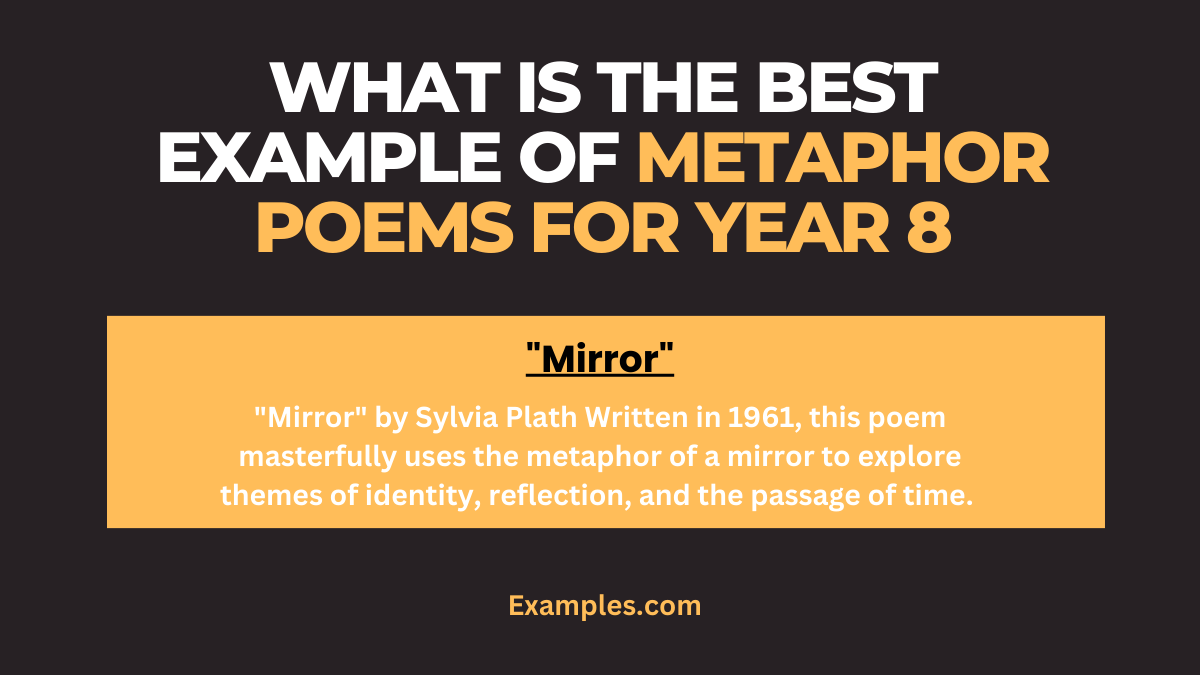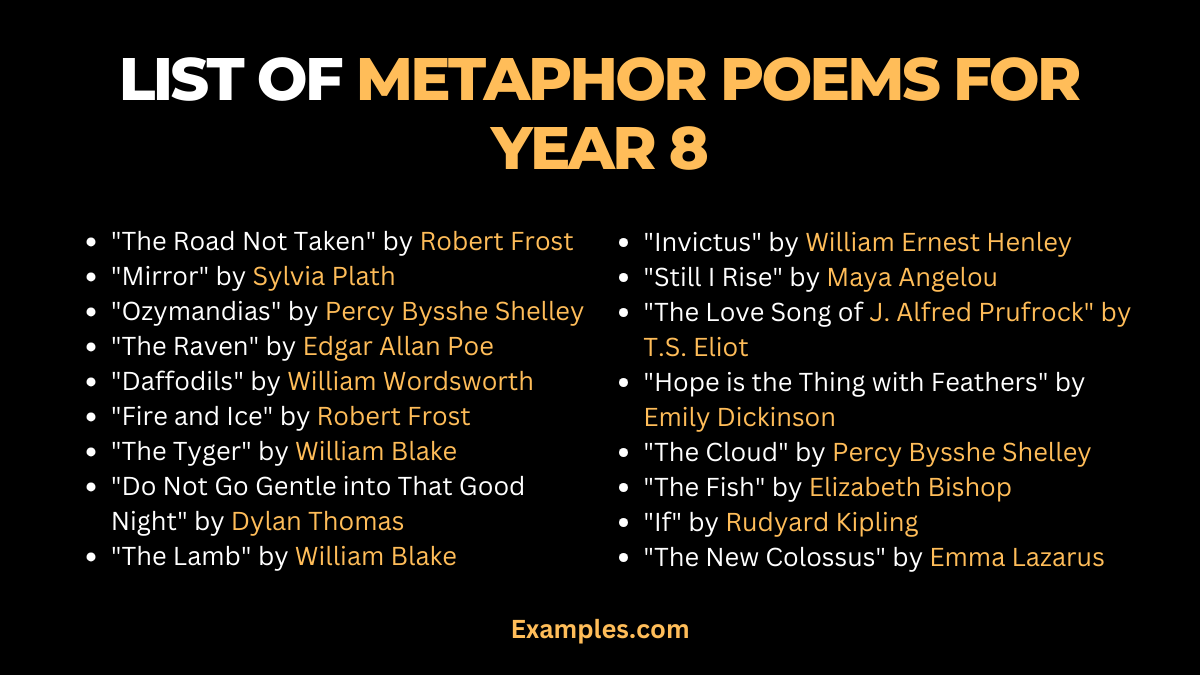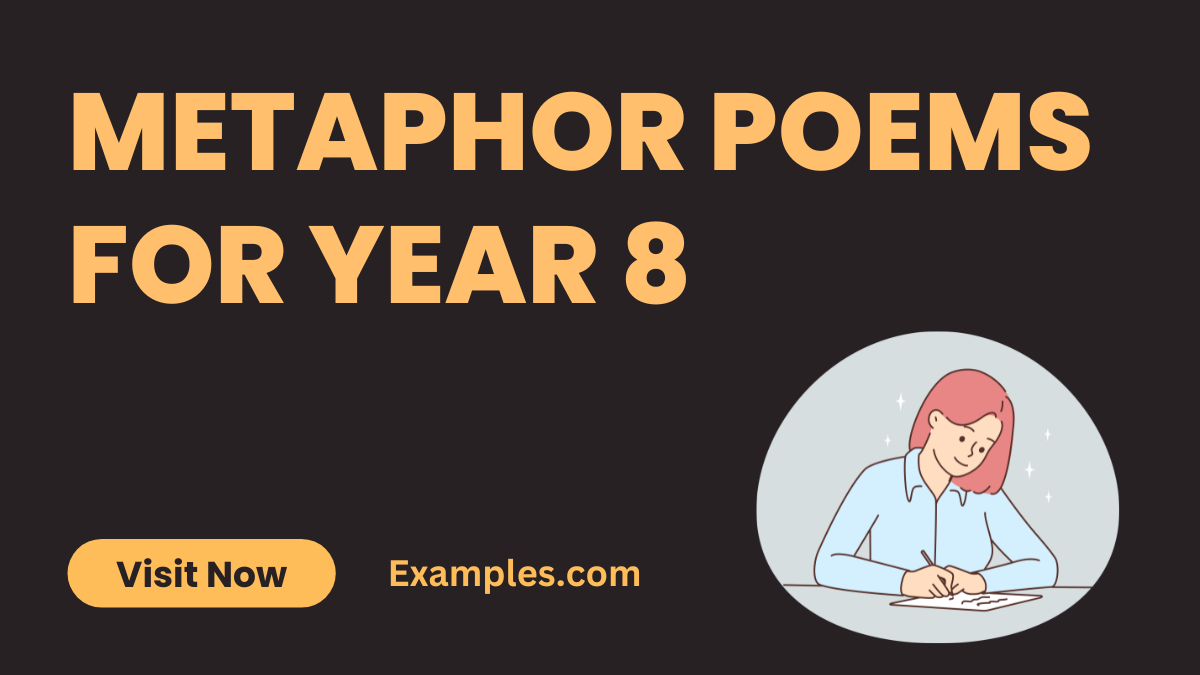14+ Metaphor Poems for Year 8 Examples
Dive into the imaginative world of metaphor poems with our comprehensive guide tailored for Year 8 students. Metaphor examples come to life in this easy-to-follow resource, perfect for young poets and educators. We unlock the secrets of using metaphors effectively, enhancing students’ creative expression and understanding of this powerful literary device. This guide not only illustrates metaphor examples but also offers practical tips to inspire and elevate students’ poetic skills. Get ready to explore and create with our engaging and educational approach to metaphor poems!
Download Metaphor Poem for Year 8 PDF
What is the Best Example of Metaphor Poems for Year 8?

One of the best examples of metaphor poems suitable for Year 8 is “The Fog” by Carl Sandburg. This poem beautifully personifies fog as a cat, subtly introducing a metaphor that captures the essence of fog’s gentle, stealthy approach and silent departure. Metaphorical Phrases and Metaphorical Poems offer a rich tapestry of language that captivates and educates. Sandburg’s use of simple yet evocative language makes it an excellent example for young learners to understand and appreciate the power of metaphors in poetry, encouraging them to explore their own creative expressions through metaphorical language.
List of Metaphor Poems for Year 8

1. “The Road Not Taken” by Robert Frost
A reflective piece from 1916, this poem uses diverging paths as metaphors for life’s choices, perfect for Year 8 students exploring complex decisions. Especially for younger audiences, such as those in grades 3 to 7, Metaphor Poems for 3rd grade to Metaphor Poems for Grade 7 bring abstract concepts to life.
Download Full Poem The Road Not Taken PDF
Metaphors:
- “Two roads” – Opening Line: Different life paths.
- “Yellow wood” – Line 1: The uncertainty and potential of life.
- “Road less traveled” – Closing Stanzas: Choosing an unconventional path.
2. “Ozymandias” by Percy Bysshe Shelley
Shelley’s 1818 sonnet uses a shattered statue as a metaphor for the transient nature of power, suitable for Year 8’s historical and philosophical discussions. The poem, with its Extended Metaphor, personifies fog as a cat, illustrating the concept through simple, yet evocative language.
Download Full Poem Ozymandias PDF
Metaphors:
- “Stone legs” – Line 2: Remnants of former glory.
- “Shattered visage” – Line 4: The fall of pride.
- “Lone and level sands” – Final Line: The erasing power of time.
3. “The Raven” by Edgar Allan Poe
Poe’s 1845 narrative poem, with its symbolic raven, is ideal for Year 8 students studying themes of loss and despair. Likewise Metaphor Poems for Year 4 to Metaphor Poems for Year 7 engage young minds in exploring Metaphor Poems About Love,Metaphor Sentence, and Simile and Metaphor.
Download Full Poem The Raven PDF
Metaphors:
- “Raven” – Throughout: Enduring grief.
- “Midnight” – Line 7: The depth of sorrow.
- “Shadow” – Line 108: The lasting effect of loss.
4. “Daffodils” by William Wordsworth
Wordsworth’s 1807 poem uses daffodils as metaphors for joy and nature’s beauty, making it a vibrant study for Year 8. These Easy Metaphor lay the foundation for understanding more complex ideas like Family Metaphor and Metaphor for Schools.
Download Full Poem Daffodils PDF
Metaphors:
- “Dancing daffodils” – Line 6: Joy and liveliness.
- “Stars” – Line 7: Endless wonder and beauty.
- “Continuous as the stars” – Line 9: Infinite and awe-inspiring nature.
5. “Mirror” by Sylvia Plath
Plath’s 1961 poem explores identity and truth which uses a mirror as a metaphor, provides profound insights, becoming an Implied Metaphor. Moreover, Mixed Metaphor and Dead Metaphor in these poems help refine their understanding.
Metaphors:
- “Silver” – Line 1: Reflective and unbiased truth.
- “Lake” – Line 10: Depth and introspection.
- “Drowned girl” – Line 17: The passage of time and self-change.
6. “Fire and Ice” by Robert Frost
Frost’s 1920 poem metaphorically discusses human emotions of desire and hate, an impactful read for Year 8 students.
Metaphors:
- “Fire” – Line 1: Passion and desire.
- “Ice” – Line 2: Hatred and indifference.
- “World end” – Line 4: The destructive nature of emotions.
7. “The Tyger” by William Blake
Blake’s 1794 poem from “Songs of Experience” uses a tiger as a metaphor for nature and divinity, thought-provoking for Year 8.
Metaphors:
- “Tyger” – Throughout: Nature’s untamed beauty.
- “Fire in thine eyes” – Line 6: Fierce life force.
- “Wings” – Line 7: The divine and mysterious aspects.
8. “The Love Song of J. Alfred Prufrock” by T.S. Eliot
Eliot’s 1915 poem is a rich modernist exploration, suitable for Year 8 students learning about metaphors in emotional and social contexts. As students progress, Metaphor Poems for Year 5 and Metaphor Poems for Year 6 delve into Metaphor for Teaching and Metaphor for Writers.
Metaphors:
- “Evening spread out against the sky” – Line 2: Overwhelming life experiences.
- “Coffee spoons” – Line 51: Life’s monotony.
- “Mermaids singing” – Line 125: Unattainable dreams and desires.
9. “The Lamb” by William Blake
From Blake’s “Songs of Innocence” (1789), this poem uses a lamb as a metaphor for purity, ideal for Year 8’s metaphor studies.
Metaphors:
- “Lamb” – Throughout: Innocence and gentleness.
- “Softest clothing” – Line 2: Comfort and care.
- “Tender voice” – Line 5: The nurturing aspect of innocence.
10. “The Owl and the Pussy-Cat” by Edward Lear
Lear’s 19th-century poem, rich in whimsy and fantasy, uses metaphorical language suitable for Year 8’s exploration of creative poetry.
Metaphors:
- “Owl and Pussy-Cat” – Throughout: Unusual companionships.
- “Pea-green boat” – Line 1: Adventures and imagination.
- “Bong-tree” – Line 13: Fantasy and absurdity.
Famous Metaphor Poems for Year 8
1. “The Road Not Taken” by Robert Frost
Written in 1916, Frost’s poem is a classic metaphor for life’s choices, ideal for Year 8 students understanding the significance of decisions.
Metaphors:
- “Two roads diverged” – Opening Line: Different paths in life.
- “Yellow wood” – Line 1: Opportunities and the unknown.
- “Less traveled road” – Closing Stanzas: The uniqueness and impact of unconventional choices.
2. “Ozymandias” by Percy Bysshe Shelley
Shelley’s 1818 poem using a shattered statue to represent the ephemeral nature of power, fits perfectly into the curriculum of Metaphor Poems for Year 8. This approach helps students grasp Metaphor in Literature, including Metaphor in Romeo and Juliet.
Metaphors:
- “Stone legs” – Line 2: Remnants of past power.
- “Shattered visage” – Line 4: The fallibility of human pride.
- “Sands” – Final Line: The relentless passage of time.
3. “The Raven” by Edgar Allan Poe
Poe’s 1845 narrative poem symbolizes grief and loss through a raven, offering Year 8 students a deep metaphorical exploration of emotion. For even younger students, Metaphor Poems for 4th grade to Metaphor Poems for 5th grade and Metaphor Poems for 6th grade introduce Example of a Metaphor in a Song and Metaphor for Kids.
Metaphors:
- “Raven” – Throughout: Enduring sorrow.
- “Midnight” – Line 7: The depth of despair.
- “Shadow” – Line 108: The persisting presence of loss.
Short Metaphor Poems for Year 8
1. “Fire and Ice” by Robert Frost
Frost’s 1920 poem metaphorically explores destructive human emotions, suitable for Year 8 students studying the power of figurative language.
Metaphors:
- “Fire” – Line 1: Passion and intense desire.
- “Ice” – Line 2: Coldness and bitterness.
- “World’s end” – Line 4: The finality of extreme emotions.
2. “Fog” by Carl Sandburg
Sandburg’s 1916 short poem uses fog to depict mystery and transience, an excellent example for Year 8’s study of metaphor.
Metaphors:
- “Little cat feet” – Line 1: The silent and subtle approach of fog.
- “Sits looking” – Line 2: Fog as an observant entity.
- “Moves on” – Final Line: The fleeting nature of moments.
3. “This Is Just To Say” by William Carlos Williams
Williams’ 1934 poem uses everyday imagery to express complex emotions, making it a great study of metaphor for Year 8.
Metaphors:
- “Plums” – Line 1: The temptation of forbidden pleasures.
- “Icebox” – Line 2: Restraint and contemplation.
- “Forgive” – Line 5: The complexity of human relationships and apologies.
Best Metaphor Poems for Year 8
1. “The Road Not Taken” by Robert Frost
Robert Frost’s 1916 poem is a profound reflection on life’s choices. Its use of paths as metaphors for decision-making makes it an essential poem for Year 8 students, helping them understand the impact of choices in life.
Metaphors:
- “Two roads diverged” – Opening Line: Represents life’s different choices.
- “Yellow wood” – Line 1: Symbolizes life’s uncertainties and opportunities.
- “The road less traveled” – Final Stanza: Embodies making unique, individual choices.
2. “Ozymandias” by Percy Bysshe Shelley
Written in 1818, Shelley’s “Ozymandias” is a powerful commentary on the transience of power and legacy. This poem is ideal for Year 8 students, offering a metaphorical insight into history and the nature of human achievement.
Metaphors:
- “Shattered visage” – Line 4: The decay of power and pride.
- “Colossal wreck” – Line 13: The inevitable decline of great empires.
- “Boundless and bare” – Last Line: The inescapable passage of time.
3. “Invictus” by William Ernest Henley
Henley’s 1875 poem is a stirring portrayal of resilience and personal strength. Its metaphors of darkness and unconquerable spirit resonate deeply with Year 8 students, inspiring courage and determination.
Metaphors:
- “Night that covers me” – Line 1: Life’s challenges and hardships.
- “Unconquerable soul” – Line 4: The enduring spirit and inner strength.
- “Horror of the shade” – Line 12: Facing and overcoming one’s deepest fears.
In conclusion, these metaphor poems are invaluable resources for Year 8 students, enriching their understanding of literary devices and the expressive power of language. “The Road Not Taken,” “Ozymandias,” and “Invictus” not only teach about the beauty of metaphors but also impart profound lessons on life, history, and personal strength. These poems serve as compelling gateways into deeper literary exploration and personal reflection, making them essential components of any comprehensive study of poetry.


